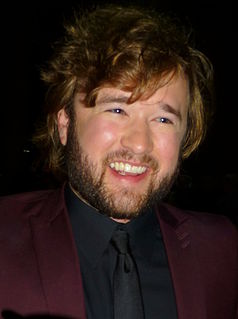A Quote by Katherine Paterson
Some say it is the elements of hope and wonder in children's books that make them special. But there are many dark young adult novels these days. Adults loved Harry Potter, though it was written for the young. In the end, it is probably up to the reader of any age to decide if this book is for him or her.
Related Quotes
I was given some Harry Potter books by a young friend. I wanted to know why young people liked it so much. And I noted that there were some values in Harry Potter that are common to many books that are popular all over the world. In the end, I think people prefer the good to win, rather than the bad.
I think so much of young adult literature sort of gets ghettoized - the title 'young adult' makes people immediately discount it. And just like with books that get written for adults, there is plenty of young adult literature that is bad. But there is also plenty of young adult literature that is brilliant.
I love young adult fantasies. While I say that, I have not seen all of the Twilight and Harry Potter movies. But I've read all of the books, and I love them. I love them because I enjoy being transported to a different world and having my imagination challenged. That's a huge part of what we do as actors. We have to imagine ourselves in a different world. And when you are in a young adult fantasy, it challenges you in the best way.
Okay. Now my skin is really prickling. I've read all the Harry Potter books, all five of them. I don't remember any half-blood prince. "What's this?" Trying to sound casual, I point at the ad, "What's Harry Potter and the Half-Blood Prince?" "That's the latest book," Garth the other trainee, says. "It came out ages ago." I can't help gasping. "There's a sixth Harry Potter?" "There's a seventh out soon!" Diana steps forward eagerly. "And guess what happens at the end of book six-" "Shh!" exclaims Nicole, the other nurse. "Don't tell her!
I've published over 100 books - and that is divided about 50/50 adult and young adult. Lately, I have been writing more YA, which is such a great genre to write it. I don't have a favourite (I usually say it's the last book I've written), but certain books do stick in the mind. My very first YA novel, The Children of Lir, will always be special to me, and, of course The Alchemyst because it was a series I'd wanted to write for ages.
To see what books were available for my older students, I made many trips to the library. If a book looked interesting, I checked it out. I once went home with 30 books! It was then that I realized that kids' novels had the shape of real books, and I began to get ideas for young adult novels and juvenile books.
The young adult literature is relatively new - it just kind of exploded in the 2000s. When I grew up, there weren't bookstores with sections dedicated to teen lit, nor was my generation raised reading books written specifically for us. Because of that, today we still think of books for teens as children's books and so when you write a book that includes sensitive topics, it just seems even more controversial. What's troubling to me about that is these are issues adults know that teens deal with. Not writing about them makes them something we don't, or can't talk about.
I never wanted to do Harry Potter. I thought it should have stayed as a book. There are some books that should be made into movies and some that shouldn't. Harry Potter is 70% imagination. When the movie comes out, it's going to be such a stereotype for kids. When they think of Harry Potter, they're going to think of what is portrayed on screen.
I don't change the language for children books. I don't make the language simpler. I use words that they might have to look up in the dictionary. The books are shorter, but there's just not that much difference other than that to be honest. And the funny thing is, I have adult writer friends [to whom I would say], "Would you think of writing a children's book?" and they go, "No, God, I wouldn't know how." They're quite intimidated by the concept of it. And when I say to children's books writers, would they write an adult book, they say no because they think they're too good for it.


































